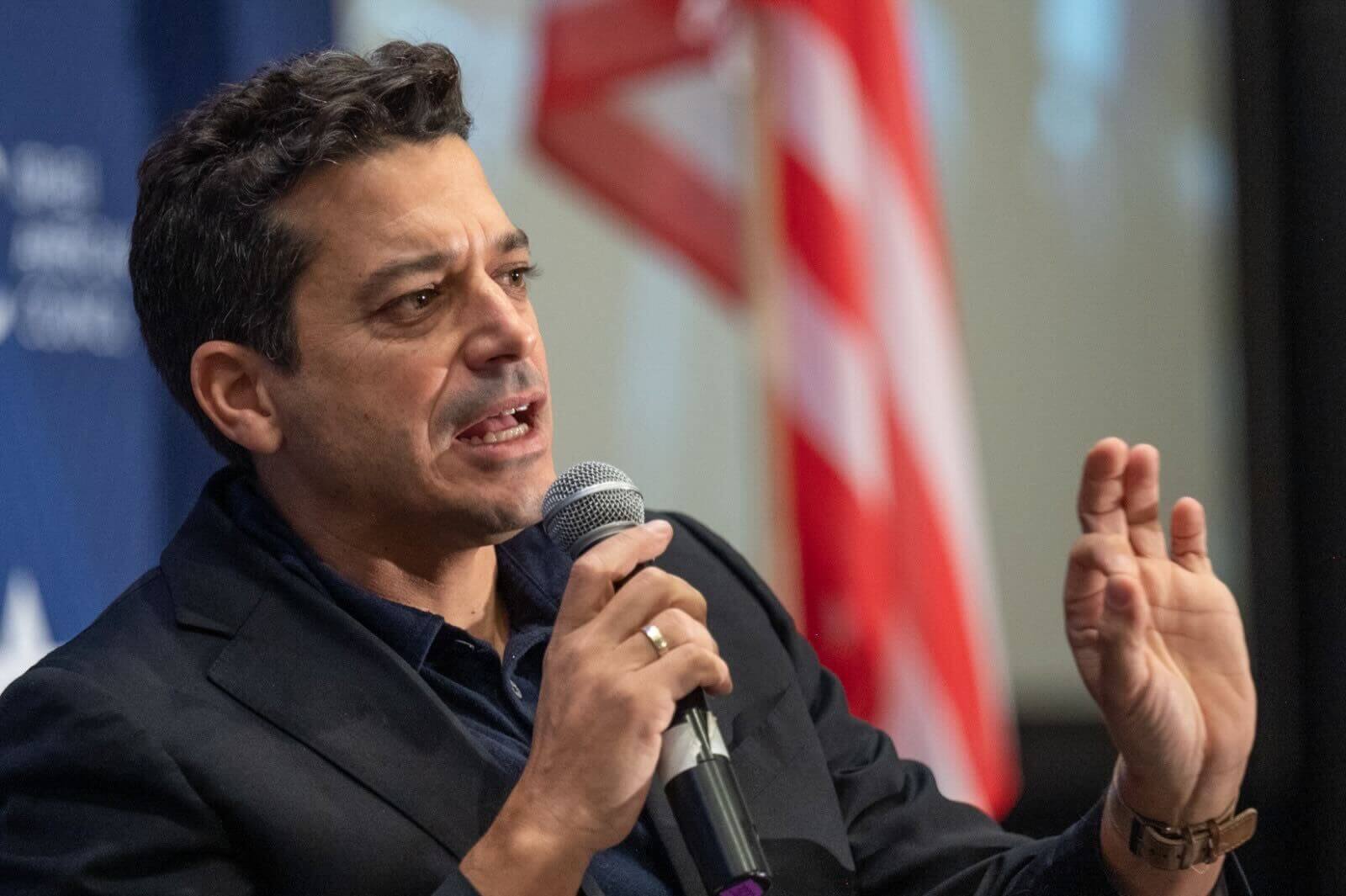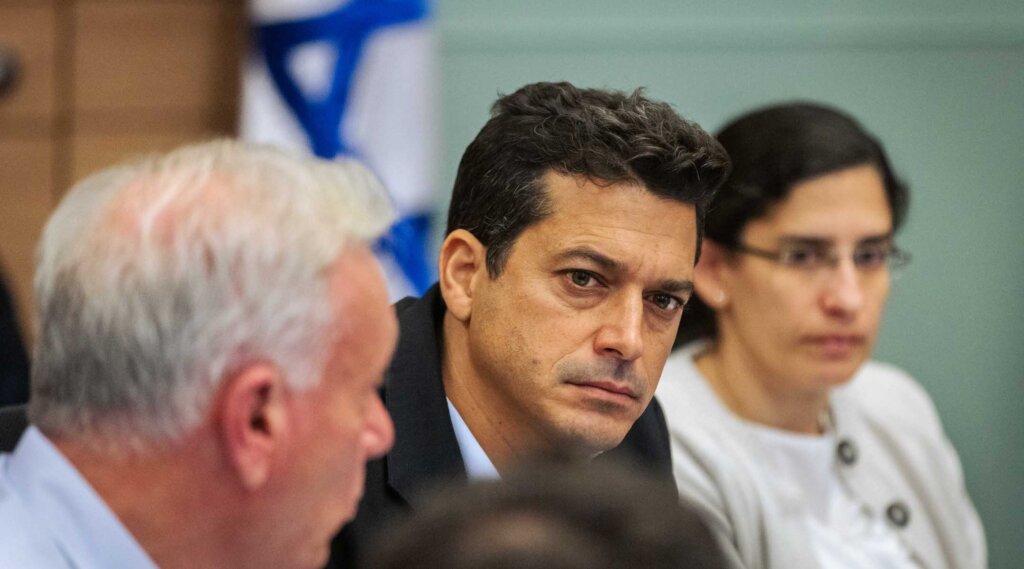Israeli emissary blames political foes for eroding relations with American Jews
Amichai Chikli, Israel’s minister for diaspora affairs, said he appreciates American Jews but is ‘unapologetic’ about his government’s agenda

Amichai Chikli, Israel’s minister of diaspora affairs, at the Israeli-American Council national summit on Jan. 20, 2023. Photo by Shahar Azran/Getty
Amichai Chikli, Israel’s new minister of diaspora affairs, touched down in the U.S. as American Jews organized protests against his government, the most right-wing in the nation’s history. These rallies are smaller than those in Israel, but their participants are as fearful as their Israeli counterparts that the country is veering away from democracy and pluralism, and taking a dangerously combative tack against Palestinians.
This makes Chikli’s job — to strengthen ties between Israel and Jews abroad, most of whom live in the U.S. — exceptionally tough. The alliance had deteriorated under Prime Minister Benjamin Netanyahu, who led Israel for a dozen years and, thanks to the November elections, leads it once again. This time he is flanked by coalition partners that many call extreme. They have backed legislation to curb the power of the high court and proposed changes to the law of return that would narrow the pool of people to which it would apply. Fears that violence will spiral have intensified. Many American Jews were unnerved last week by an Israeli raid in the West Bank city of Jenin that left 10 dead. And they mourned the seven killed in a terror attack at a Jerusalem synagogue Friday.
American Jews, the vast majority of whom vote against right wing candidates in their own country, feel increasingly discouraged with Israel.
Chikli, 41, who landed the ministry job because he has been willing to make bold political moves and challenge members of his own party, is painfully aware of the disconnect. But he said in a recent interview that he believes Jews abroad still need to be heard by Israel. “We don’t have better ambassadors than the Jewish communities in diaspora,” he said. “Their voice is very important, and they all genuinely love Israel.”
In the U.S. last week, Chikli sought to assuage Americans’ concerns about the future of Israeli democracy.
But at the same time, he placed blame on the Israeli opposition and media for what he said was American Jews’ wrongheaded understanding of the Jewish state’s new leadership. He charged that they are being “greatly influenced” by relentless attacks on the new government. And he blamed Yair Lapid, the former prime minister and the current opposition leader, for “causing massive damage” to U.S.-Israel relations and the Israel-diaspora relationship.
Listening — but not to everyone
In his brief visit to the U.S., Chikli packed his schedule, meeting with leaders of the Reform, Conservative and Orthodox streams of Judaism, as well as the heads of the Jewish Federations of North America, UJA-Federation of New York, Conference of Presidents of Major American Jewish Organizations, and Jewish Community Relations Council of New York. He met with the board of Momentum Project, a group sponsored by the Israeli government that seeks to strengthen Jewish identity and connection to Israel. He also addressed an annual conference hosted by the Israeli American Council, a group of ex-pat Israelis, in Austin, Texas.

He refused to meet, however, with the leadership of J Street, the prominent liberal advocacy organization that calls itself “the political home of pro-Israel, pro-peace, pro-democracy Americans.” Chikli called the group “hostile to Zionism and the state of Israel.” He said its lobbying supports policies that “serve Iran and the Palestinian Authority” and “advances antisemitic trends.” Ron Dermer, the former Israeli ambassador to the U.S. who is now the minister for strategic affairs, also snubbed the group during his tenure in Washington, D.C.
Logan Bayroff, a J Street spokesperson, called it “self-defeating and short-sighted” for the government of Israel to refuse to meet with the group. “Israel is the national homeland of the Jewish people, not just those who agree with Benjamin Netanyahu and Itamar Ben-Gvir,” Baayroff said, referring to Israel’s national security minister, who has been much criticized for inflaming tensions with Palestinians. He noted that J Street’s views on the Israeli-Palestinian conflict and its focus on democracy are shared by a large portion of U.S. Jews. “It shows just how deeply out of touch this government is with much of our community,” he said.
Chikli himself is a hardliner on the conflict. He has called Palestinian President Mahmoud Abbas “one of the greatest Holocaust deniers of our generation and a distinct antisemite” for accusing Israel of carrying out “50 Holocausts” of Palestinians as he stood alongside the German chancellor in Berlin last year. On Sunday Chikli called the Palestinian Authority a “neo-Nazi entity.”
“We may disagree on policy and criticism is welcome, but all we ask is the trust and backing from diaspora Jews,” he said.
From Camp Ramah to the cabinet
The son of an ordained Conservative rabbi, and an alum of Camp Ramah, a network of Jewish summer camps affiliated with the Conservative Movement, Chikli fashions himself as an independent who speaks his mind. In an interview with the Forward in 2021, Chikli said he had visited the U.S. numerous times and suggested that many American Jews are affiliated with “an anti-nationalistic, anti-liberal” ideology that will disconnect them from their ethnic origins.
“I have the ability to create an open and frank dialogue — though unapologetic — with American Jews,” Chikli said in last week’s phone interview, adding that his views “haven’t changed one iota” since he was in the political opposition.
He came to prominence in Israeli politics just weeks after he entered the Knesset in 2021 as the lone conservative rebel in the previous government. Formerly a member of the rightist Yamina party, Chikli accused its leader, Naftali Bennett, of allying with the left and an Arab-Israeli party for personal gain. Bennett’s government lost its majority last April after additional members of Yamina quit the coalition.

After joining the Likud Party and following the election, Chikli asked to lead the Ministry for Diaspora Affairs, the Ministry for Social Equality, and also to head the campaign against the Boycott, Divestment and Sanctions movement.
Netanyahu gave it all to him.
On Sunday, Chikli presented a comprehensive report about antisemitism in the diaspora at the weekly cabinet meeting in Jerusalem. He related the rise in antisemitic incidents to a hostile atmosphere towards Jewish students on college campuses, and told his colleagues that he is working on a strategy to combat it.
On the offensive
As much as Chikli presented his trip as a listening tour, he also came to talk — to explain his government’s thinking behind initiatives critics have labeled anti-democratic.
Currently Israeli Supreme Court judges are appointed by a committee that includes some, but not a majority, of lawmakers. A new government plan would give them a majority, a move the opposition said would politicize the judiciary. Chikli called it “ridiculous” to claim that the present method of seating judges is normal or “even close to what is custom in other western countries.”
He urged American Jews to await committee hearings and Knesset debate on the issue before drawing conclusions. “There will be changes,” he said.
He also dismissed concerns about proposed changes to the Law of Return, which allows anyone with at least one Jewish grandparent to immigrate to Israel as long as they do not practice another religion. Some American Jewish groups have warned that restricting immigration by abolishing the so-called “grandchild clause” will alienate the diaspora.
Chikli in response referred to a presentation — prepared by a right-wing think tank, the Kohelet Policy Forum — that forecast that a majority of immigrants eligible for Israeli citizenship in the future would not be Jews, but mostly non-Jewish immigrants from former Soviet republics, Russia and Ukraine. “Right now, the law is broken and it’s costing us dearly,” he said.

But he said he told Jewish leaders he would serve as their conduit to the committee that will consider the bill and that he believes that, unlike decisions on homeland security and the economy, the concerns of Jewish leaders abroad should be taken into consideration as immigration reform is legislated.
The Likud politician said that religious matters concerning conversion, kashrut and the 2017 Kotel deal, which designated protected space at the Western Wall for various streams of Jewish practice, didn’t come up in his meetings with Americans. And he said he doesn’t foresee any legislation that would change the status quo at this point.
“We just had an election and the results were crystal clear,” Chikli said about the positions of the new government. “We were very honest about our agenda, and it is our responsibility to follow this agenda.”
A message from our Publisher & CEO Rachel Fishman Feddersen

I hope you appreciated this article. Before you go, I’d like to ask you to please support the Forward’s award-winning, nonprofit journalism so that we can be prepared for whatever news 2025 brings.
At a time when other newsrooms are closing or cutting back, the Forward has removed its paywall and invested additional resources to report on the ground from Israel and around the U.S. on the impact of the war, rising antisemitism and polarized discourse.
Readers like you make it all possible. Support our work by becoming a Forward Member and connect with our journalism and your community.
— Rachel Fishman Feddersen, Publisher and CEO





























